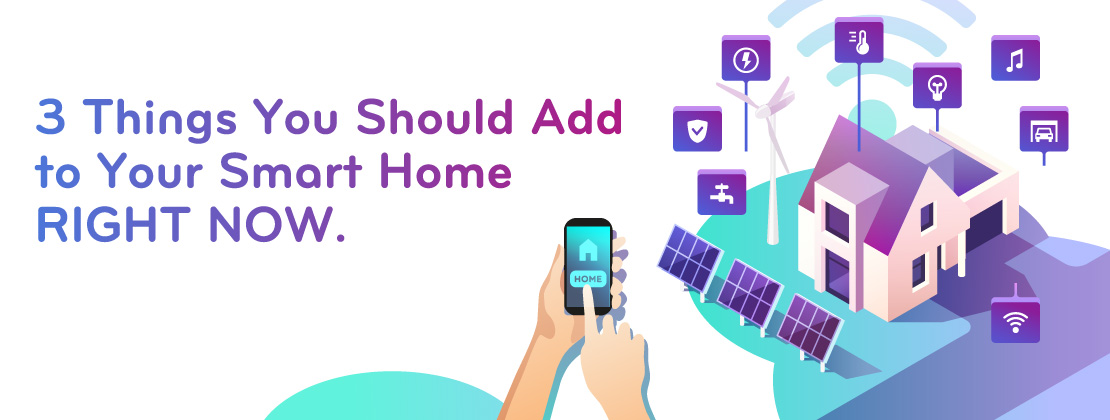3 Things You Should Add to Your Smart Home NOW
- Tue, 05/22/2018 - 17:22
- webdev_india
- Smart Home

1. Voice Control
Voice assistants like Amazon Alexa and Google Assistant are ushering in a completely new way to interact with your smart home devices. The Amazon Echo Dot and the Google Home Mini are under $50, and every central innovative home platform natively supports them. If you haven’t yet integrated voice control into your system, now is the time to do it!
What can I do with voice control?
Controlling your home with voice commands offers you much more than a novelty. The ability to say, “Alexa, set the thermostat to 73 degrees,” or “Alexa, turn off the lights,” may appear to be a minor advancement. But, once you begin using them, you’ll be amazed at how quickly you come to rely on them. It’s not about being lazy and avoiding getting up off of the couch to do something. It’s about adding a level of comfort and convenience to your home that no other $50 device can come close to matching.
2. Security
You’ve probably seen a few stories online written about security flaws or unauthorized access to smart home systems.But the vast majority of security intrusions are because of weak passwords, unencrypted Wi-Fi networks, and out-of-date firmware/drivers.These are all things you can fix before they become an issue! Here are a few basic steps to create a more secure smart home:
Don’t Wait to Install Software Updates
While many smart home platforms, like Smart Things, perform automatic updates to their firmware, others require that users initiate updates. Failing to keep firmware updated is one of the most significant security threats to your entire system.
Here’s a list of devices to check updates
- Smart Home Hub/Controller
- WiFi Smart Home devices such as door locks, smart plugs, and security cameras.
- Internet Router and Wireless Access Points
- Home computers and laptops (run Windows Update, or Updates from the App Store for Mac)
- Smart Phones
Secure your WiFi network
It might surprise you, but many people still have their wifi network unprotected.And even those who do have wifi security enabled are using outdated and less secure methods of encryption.The best WiFi security method commonly available is WPA2 with AES encryption and be sure to disable WPS (Wi-Fi Protected Setup). If your router only supports WPA or WEP encryption, now may be a good time to upgrade to newer and more secure hardware. And remember to check your internet router for firmware updates as well. Security holes are found regularly and router manufacturers release firmware patches on a regular basis.
3. Water Leak Detection
Water Leak Detection
For most homeowners, water leak detection isn’t considered an integral feature of their smart home setup. But when we believe that 37% of homeowners have experienced water damage, the average cost of a claim is $6,965, and a whopping 98% of basements will experience water damage during their lifespan, it might change our perspective. There are many areas water leaks can occur, but some the most common are failed water heaters, overflowing air conditioner drain pans, washing machine leaks, dishwashers, and bathroom fixtures.
It’s impossible to prevent leaks from ever occuring, but you can make sure you’re immediately notified when there is a leak–and even trigger a whole-home water shutoff valve to stop further damage from occuring. Here’s a short list of locations you should be placing water leak sensors:
- Behind the Washing Machine
- Under the Water Heater (if you have a drain pan, place the sensor in it)
- Inthe Air Conditioner’s drain pan
- If you have a basement, place one near the sump pump.
- Behind Toilets
- Behind the Refrigerator
Your prevention capabilities increase significantly if you also install a whole-home water shutoff valve. These smart valves connect in-line with your water main (you’ll need a plumber to install it) and can be triggered to automatically shut off water to the entire house if any of the leak sensors detect water. Even if you’re on vacation and thousands of miles away, your home can sense a leak and respond immediately. This can save tens of thousands of dollars in damage. And depending on your insurance provider, you may qualify for lower homeowner’s insurance rates if you have a water detection and shut off system installed!